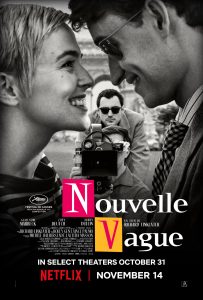
“Nouvelle Vague” (“New Wave”)
(USA/France)
Metacritic (8/10), Letterboxd (4/5), Imdb.com (8/10), TMDB.com (8/10), Imdb.com critics review
#BrentMarchant #NouvelleVague #FrenchNewWave #JeanLucGodard #JeanPaulBelmondo #JeanSeberg #Breathless #RichardLinklater #homage #parody #influentialfilm #Netflix #cinematicimprovisation #FrancoisTruffaut #ClaudeChabrol #moviecritic #CahiersduCinema
Landmark moments in virtually every area of endeavor are worthy of, and frequently celebrated in, films that applaud the significance of these accomplishments, and that even includes groundbreaking developments in moviemaking. These cinematic commemorations are generally imbued with a sense of respectful reverence regarding their subject matter, recognition befitting such achievements. However, the latest offering from director Richard Linklater presents a puzzle on that front, given that it incorporates a pervasive degree of ambiguity that may leave viewers scratching their heads, despite the undeniable excellence of the picture itself. In 1959, as the French New Wave filmmaking movement was beginning to find its stride through the works of new directors like François Truffaut (Adrien Rouyard) and Claude Chabrol (Antoine Besson), another new aspiring talent, Jean-Luc Godard (Guillaume Marbeck), a longtime, decidedly restless movie critic at the magazine Cahiers du Cinéma, began work on his first project, “Breathless,” the story of a thief on the run and his relationship with a young American woman in Paris. The film would star Jean-Paul Belmondo (Aubry Dullin), a longtime friend of Godard and newcomer to the business, and Jean Seberg (Zoey Deutch), a rapidly rising star in Hollywood circles. Like other New Wave offerings, the production featured innovative filming techniques, new approaches to storytelling, and alternative, sometimes edgy content compared to conventional works of French cinema. However, in the interest of experimenting with the untried, Godard took these principles to an extreme, working without a script, not informing his cast of what was being asked of them, making minimal use of rehearsal and shooting time, and abandoning many of the accepted standards of traditional filmmaking. Needless to say, this way of working frustrated his stars, as well as his producer, Georges de Beauregard (Bruno Dreyfürst), who envisioned his investment evaporating before his eyes amidst the relentless chaos on the set of this shoot. Yet, when offered suggestions or given orders on how to proceed, Godard would not be moved, insisting that his improvisations and spontaneity were essential to the creation of this project. In telling Godard’s story, Linklater masterfully taps into the rampant disorder on the set, depicting the filmmaking as an unfolding trainwreck, frequently commented upon by Godard with vacuous, stream of consciousness observations and justifications about how and why things were transpiring as they did. Yet, as history has since shown, “Breathless” went down as a groundbreaking work of cinema in the French New Wave, inspiring innovations that would subsequently make their way into the art of filmmaking, influences that have lasted to this day. But, based on this offering, one might readily develop doubts. Indeed, is “Nouvelle Vague” intended as homage or parody? Good cases could be made for either argument. (In the interest of full disclosure, I’m not an especially huge fan of “Breathless”; while it may have been inventive in some ways for the time it was made, it comes across today as terribly dated, perhaps even pretentious, despite the influence it had on many other New Wave releases that came along in later years.) Nevertheless, whatever impression one might ultimately take away from this film, it’s undeniably an impressive work, beautifully filmed in gorgeous black and white, with fine performances by the ensemble, an excellent period piece production design, super cool costuming (right down to Godard’s ever-present sunglasses), a smooth, sophisticated jazz soundtrack, and utterly hilarious yet understated writing. Admittedly, this one is unlikely to appeal to anyone other than diehard cinephiles and those intimately familiar with “Breathless” and its cast and crew, but those in the know on these subjects are sure to enjoy this release immensely as one of 2025’s best films and, arguably, one of Linklater’s most noteworthy projects. Think of it as a love letter with a serious, tongue-in-cheek funny bone, and you’ve got an idea what this one is all about. This Netflix offering may not leave you breathless, but it will likely leave you vastly entertained.



